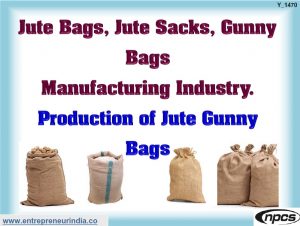Jute Bags, Jute Sacks, Gunny Bags Manufacturing

Jute Bags, Jute Sacks, Gunny Bags Manufacturing Industry. Production of Jute Gunny Bags
Jute is 100% bio-degradable & recyclable and thus environment friendly. Jute is a natural fiber with golden & silky shine, and hence nicknamed as The Golden Fiber.
Jute Bags/Jute Sacks/Gunny Bags have been widely used for packaging of various commodities viz. Cereals, Cashew nuts, Ground nuts, Pea nuts, Cotton, Palm Kernels, Gum Arabic, Coffee beans, Cocoa beans, Rice, Paddy, Wheat, Maize, Copra, Lentils, Sugar, Cement, Fertilizers etc.
Jute Gunny Bags are extensively used for carrying bulk material such as pulses, grains, etc. from one place to another. Jute Gunny Bags are used to store large anoints of weights in them. These bags are suitable to be used in commercial and industrial places for transporting wheat, rice and other grains.
Features:
- Eco-friendly nature
- Bio-degradable
- Can be easily re-used
- Easy to clean
- Excellent finish
- Smooth texture
- Highly spacious
Market Outlook
India exported Jute Bag to 185 countries globally with the total export value of 181.39 US$ million in 2018. Top countries that import Jute Bag from India are Ghana, USA, United Kingdom, Australia, and Côte d’Ivoire.
India is the largest producer of raw jute and the second largest exporter of jute and jute based goods in the world, next only to Bangladesh. India, Bangladesh, China, Myanmar, Nepal and Thailand are at present the major producers of Jute, Kenaf and Roselle fibres. India, Bangladesh and China are the large producers. Jute is a natural fiber popularly known as the golden fiber.
Jute Bag Export facts and Information:
- Total export of Jute Bag from India in last 30 days amount to 5,819.12 INR million.
- Major Indian ports for exporting Jute Bag products are MUNDRA, KOLKATA SEA, NHAVA SHEVA SEA, COCHIN SEA, PIPAVAV(VICTOR) PORT..
- The top international ports for importing Jute Bag are JEDDAH, JEBEL ALI, JAKARTA, SHUWAIKH, and DAMMAM.
In recent years, jute cultivation has also been extended to the states of Meghalaya, Tripura, Tamil Nadu, Maharashtra and Uttar Pradesh.
Jute industry, in India, is mainly a raw material oriented Industry. Hence, majority of the jute mills are concentrated near jute growing tracts of West Bengal along the banks of the Hugli River. West Bengal alone accounts for 63.55 per cent of the total production of jute goods in the country. Besides West Bengal, Orissa is the second largest producer of jute goods in the country (about 17 per cent). Other important centres of jute industry include Samastipur, Katihar and Darbhanga in Bihar; Kanpur, Gorakhpur (Shahjanwan) in Uttar Pradesh; and Raigarh in Chhattisgarh.
It is one of the cheapest and the strongest of all natural fibers and considered as fiber of the future. Jute is second only to cotton in world’s production of textile fibers. India, Bangladesh, China and Thailand are the leading producers of Jute. It is also produced in southwest Asia and Brazil. The two main types of jute, white jute (Corchorus Capsularies)and dark jute or tossa (Corchorus Olitorius) are grown in India, Bangladesh, Thailand, China and south Asian countries.
The global jute bag market reached a value of US$ 1.8 Billion in 2018, exhibiting a CAGR of around 11.5% during 2011-2018. The global jute bag industry is currently at a nascent stage with encouraging growth aspects. The demand for jute bags has witnessed a surge over the past few years, particularly in the European Union. This can be attributed to the growing environment consciousness in the region.
With the increase of population and civilization, the demand for the jute bag is also increasing; awareness about the environment is also the reason for jute bag demand. The government has already taken steps toward the eco-friendly product, and as result, they ban the use of plastic bag therefore the jute bags are the best replacement for plastic bags.
The imports of jute bags in non-producing countries have also been facilitated by the ban on plastic packaging materials and bags. Additionally, the benefits offered by jute bags such as their biodegradability, durability, low cost, high strength, etc. have further supported the market growth.
Some of the key players operative in the market include Aarbur, Ashoka Exports, Hitaishi-KK, Howrah Mills Co. Ltd., Shree Jee International India Ltd. and Gloster Limited.
See more